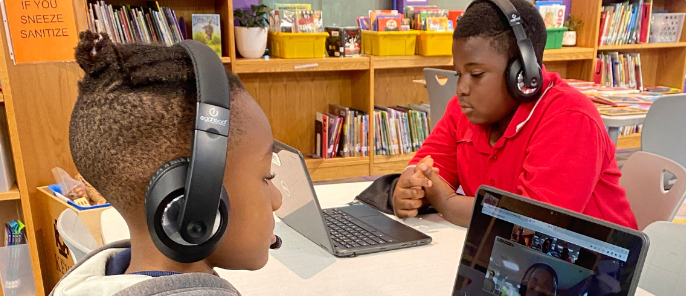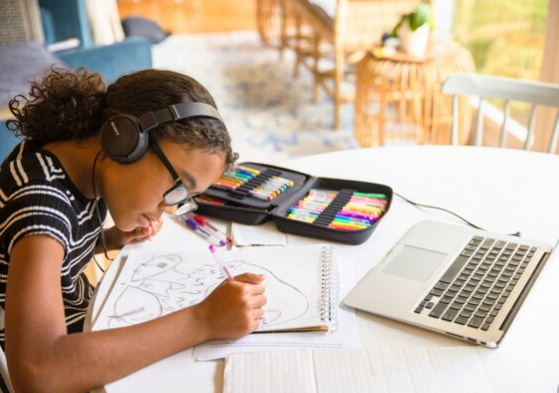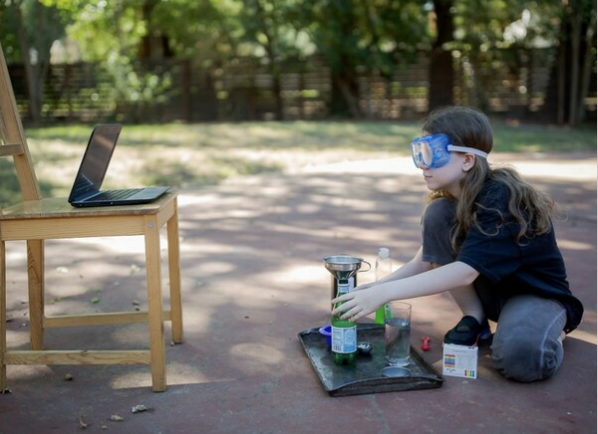
Outschool and its nonprofit partner Outbridge work together to help families in states where education choice has been expanded take full advantage of their opportunities.
School choice means options and opportunity. It also packs daunting responsibility for parents who want to do what’s best for their offspring but are uncertain where to turn.
It’s one thing to send the kids off to the neighborhood public school, attend the occasional PTA meeting and otherwise hope for the best, because that’s what millions of parents have done since Horace Mann.
But what happens when state legislatures swing open the doors to seemingly limitless educational options, and pony up several thousand dollars per student to boot?
How do parents make the best, wisest choices for their youngsters?
Outschool, which links students and tutors in a wide array of interactive learning classes, and its nonprofit partner Outschool.org, have some answers. Indeed, it’s difficult to tell where Outschool ends and Outschool.org begins, proof the bright folks in charge are doing things right.
By design, the organizations operate in symbiosis, each benefiting from the other. Outschool.org may have emerged from Outschool’s success, but Outschool.org seems poised to help Outschool — a $3 billion company with bookings of more than $100 million in 2021 — significantly expand its current reach of 1,000,000 learners.
Launched in 2016 to help beef up homeschool curriculum, when COVID-19 closed America in early 2020, Outschool was perfectly situated to serve the needs of kids who were suddenly expected to learn somewhere other than their classrooms.
To help serve low-income families, Outschool launched its nonprofit arm, Outschool.org, beginning with a family financial assistance program early in the pandemic, helping make its moldable learning experiences available to students otherwise struggling with school shutdowns and at-home learning.

Buoyed by financial support from Outbridge, homeschool cooperative Engaged Detroit is helping parents make inventive decisions about education.
Ultimately, the family financial assistance program, and a community partners program serving 25 organizations nationwide keen to expand virtual and hybrid learning, Outschool.org reached about 35,000 students.
With the vast majority of schools returning to their pre-COVID schedules at the start of the most recent academic year, Outschool.org closed down its aid program last August.
Never letting an opportunity for self-education to go to waste, however, the Outschool.org team gained an epiphany from its pandemic experience, creating a new program called Outbridge that provides direct-to-family scholarships and pairs it with navigation support and community events.
“And this is where Outbridge comes into the picture,” says Outschool.org Executive Director Justin Dent. “We realized that just providing financial access wasn’t enough to … really address the problems for the learners that we work most with — black, Latino and indigenous learners,” he says.
“So, we’re really focused on serving low-income and marginalized communities … how we could best support families and communities coming out of the pandemic with the tools that … we were learning they needed.”
And what they needed is — cue the buzz phrase — choice navigators. That is, trained and certified experts whose assignment is to help parents and students identify their ideal matches in the rapidly expanding universe of school choice.
It would be beyond laudatory if Outbridge simply maintained providing financial assistance for education options to low-income families. But the sudden explosion of opportunity, accompanied by an avalanche of information, has been attended by unexpected stasis, what Dent calls “decision fatigue.”
How do you pick the right learning experience? How do you know it’s the right learning experience for my kid? What happens if we make the wrong choice? What if the choice we make isn’t available? How do we set up a successful backup plan? And how do you choose when you’ve never before been asked what you want?
Traditional public school design often fosters a disconnect between opportunities and parent/student goals, Dent notes. The result is a crippling lack of confidence about commandeering the educational steering wheel.
One upshot of institution-infused temerity: During Outschool’s pandemic family assistance program, only 6% of families who received stipends to use on any Outschool platform were exhausting their funds.
“It was a big surprise for us,” Dent says. “That’s when we began to really pay attention to what the dynamics are that help families make decisions.”
The issue, Outschool researchers discovered, was trust. Left to their own inexperience, lower-income parents trusted neither the opportunities presented or their ability to choose among them.
It turns out access to money and information are not enough to make school choice operate for everyone, particularly those who, traditionally, have been denied access to the levers of education.
That revelation led Outschool to, perhaps, the magic key: Gathering together families interested in — or simply curious about — school choice.
Those attending community events in which Outschool took part would share experiences, provide insights, and ask questions among neighbors, people whose lives were similar to theirs.
Proof, meet pudding: After each community event, the spending from Outschool personal accounts soared, a sure indication that trust had been forged. And once those bonds are secure, families feel emboldened to discover more.

Outbridge provides a menu of community-based and virtual learning options for parents to purchase with pre-authorized debit cards.
Stories emerging from Outbridge’s partnership in Detroit, where, as recently as 2018, public schools ranked worst in the nation by the National Assessment of Educational Progress, are heartening.
Buoyed by financial support from Outbridge, Engaged Detroit — a homeschool cooperative serving black families — is helping parents make inventive decisions about education.
Some of the purchases are what you’d expect: school supplies, books, online classes. Other buys are likely to surprise, including enrollments in sports leagues or community music programs, weekend or summer learning camps, museum memberships, even the YMCA.
“As families start telling each other to go to community events, they tell more families,” says Kristofer Comeforo, a Harvard doctoral resident for Outschool whose final-year project has been designing Outbridge and helping get it launched. “These things just keep perpetuating over and over. It’s got to be a revelation for parents to realize there is no one educational avenue they have to shop from with these ESA scholarships.”
If Outbridge organizers have learned anything, it’s that the success of school choice almost certainly will hinge not merely on the availability of — that phrase again — choice navigators, but having that access supported by ESAs. Accordingly, the universal school choice plan recently passed by the Florida Legislature and signed by Gov. Ron DeSantis (providing up to $8,700 annually for students who opt in), includes spending on choice navigators.
“We were really inspired by the Florida program,” Dent says. “We do think the Florida legislation is going to inspire others, and I think this notion around being able to use ESA funds specifically for navigation support is a really important one.”
As Outschool has learned, empowering deciders to make the best decisions is fundamental to school choice success.